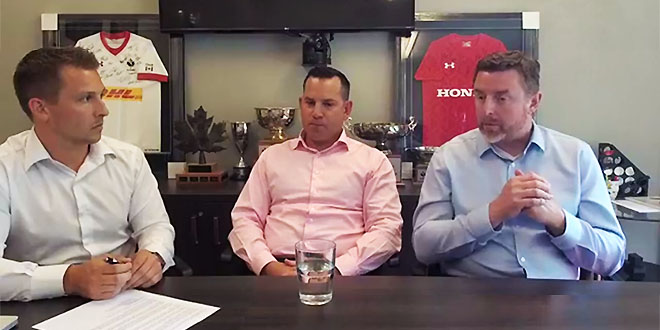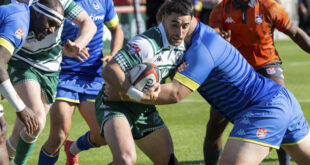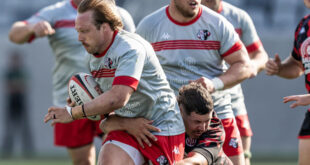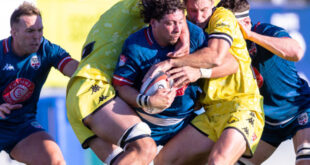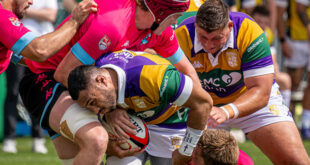Rugby Canada CEO Allen Vansen and Jim Dixon, General Manager of Rugby Operations and Performance, held a Q&A for fans on the Rugby Canada Facebook page on Wednesday afternoon.
During the one-hour session they addressed a number of topics, including not limited to the men’s XVs program, the upcoming Women’s World Cup, both the men’s and women’s national 7s teams, the pay-to-play model at age grade level, the prospects of professional rugby in Canada, the state of the Canadian Rugby Championship, and much more.
Below is a transcript of seven of those answers, with many more answered over the hour. The video in its entirety can be viewed at the bottom of this page.
Q: Can you give an overview of what came out of the review after the 2015 World Cup and what were some of the key priorities leading into the 2017 qualifiers and ultimately 2019?
JD: Fundamentally our goal was to focus on four or five specific strategic initiatives for the program. That was to build a XVs-specific rugby squad. That was to create a daily training environment for our XVs players here in Canada.
There was two significant elements to that, the first being to enhance and improve the strength and conditioning of the players. They were a long way off being able to compete at international level. The second critical piece was meaningful games. We had to improve and increase the number of games that players were playing to prepare themselves for those critical test windows and most importantly for the 2019 Rugby World Cup.
Some of the secondary ones that were part of that process were investing in talent ID and our performance environment across Canada. We’ve spent the last 6-9 months working on a framework with some of our performance partners like World Rugby, some of our stakeholders, the provincial unions, the technical leads within those unions, on building our plan that we can start to implement through this cycle which will have impact on 2023 and 2027.
A couple of the other critical pieces that were highlighted out of that review, which impact 2019 and 2023 as well, are improving our pathway coaches. We can’t have quality players without great coaches. There’s a lot of young aspiring coaches in Canada who want to coach Canada, be that at age-grade level, 7s or XVs, so we’re trying to support a production line of Canadian coaches who can then step up and be part of our national team programs. We’re fortunate to have people like John Tait, Morgan Williams, Sandro Fiorino, and others involved in our national team pathways, but it’s about growing that group of people.
Critically underpinning all of that is trying to eliminate the pay-to-play concept. We know that our junior players are burdened still with that cost of putting on the jersey for Canada. We’re working on a long-term strategy to try and eliminate that.
Obviously you don’t see immediate returns from a lot of that stuff, it takes time. Specifically right now the focus is on getting to the 2019 World Cup. The goal we set was being there. We’re still on the road. Our goal was to get that ticked off against the USA, and we didn’t achieve that. We’ve got to have a really good look at what we can do in the immediate future to make sure we get a result against Uruguay.
Q: What is the short term plan that we are ready to compete in the two games against Uruguay and we book that Americas 2 position?
JD: The priority is two-fold. One, ensuring that we have access and all of our players are available, fit and healthy. That goes for the Canadian-based players or those based in Europe or other places around the world.
The second piece is fixtures. We’ve built our fixture list for our domestic players to make sure that they’re in the best possible state to go into those games in January. That starts very soon with the CRC, leading into a Canada ‘A’ tour in October down to Uruguay which is a great opportunity as well to get our feet in the marketplace and make sure we have real clarity on all those logistical pieces that will be important when we go down there in January.
Then we go into the November tour. We’re looking at three or four fixtures in that window, for our critical group of domestic players complimented by our European-based players. Then some friendlies planned for January, and hopefully a Regulation 9 camp as well which is when we can bring our foreign-based players for a couple days to spend some time together.
Q: What are the details regarding the review of the loss to the USA and the June series?
AV: We’re asking the high performance review committee and the group that’s going to look at the June tour to really come out with some clear actions that we need to implement, similar to what Jim reviewed in terms of the action plans coming out of the 2015 World Cup. We’ve got some clear actions, we’ve got some key steps that we can make very decisive decisions on, not being afraid to be bold in terms of what we need to do not only to qualify against Uruguay but also to have a competitive Rugby World Cup.
Coming out of that will be like there was in the review from 2015. There will be some longer-term actions items, you don’t just turn this around overnight. It’s obviously a longer-term process, keeping our eye on the ball in terms of 2023 and and 2027 as well. Having this review to really identify what some of those key steps are and decisions we can make in the very short term that lead to 2019, and then a longer-term strategy that will work with our provinces and all of our stakeholders in World Rugby to bring our men’s XVs program back to where it rightfully should be.
Q: Everyone in the Canadian rugby community wants professional rugby here in Canada. What’s the latest update and where are we at with negotiations?
JD: To be honest, there’s still a lot of options on the table. We were very hopeful that the most recent competition in the USA [PRO Rugby] would grow and be successful. Unfortunately that didn’t happen. We were very measured in our approach to entering that competition. There’s strong interest from both Pro 12 and Super Rugby to move into the Americas.
More importantly, from my perspective, I think we’ve got to get our domestic environment right. We’ve got to have a platform and the players and coaching staff and all the other elements to be able to support that long-term. It’s great to have them come here, we want them to come here, we want to be a part of those competitions, but we have to be able to sustain competitive environments within those competitions that fills stadiums, that draws fans to the game. Critically, for us right now, it’s about focusing on being able to actually be competitive.
In order to do that, we’ve got to work on developing our coaching across the country, the level and standard of that coaching. We’ve got to focus on those key things that drive the fundamentals of being successful. We’ve heard it time and time again that strength and conditioning is a huge element of the game now and we have to improve that. Coming back to some of those outcomes and findings from the initial World Cup review from 2015, we’ve got to start to really implement those pieces at the lower levels.
We’re in consistent dialogue with all of those entities that are looking to bring professionalism to North America. The focus right now, from my end, is making sure the system can support whatever comes here.
Q: What is the pathway for coaches up to the national program?
JD: There’s a number of elements to that. There’s the standard national framework of coaching certifications. All coaches should be encouraged to travel through that journey. The other piece is getting involved both at provincial and CRC level programs. We use the nationals, the provincial programming, and the CRC, as a platform to select coaches to be a part of our national age-grade and national senior programs. From that we target specific personnel for further development.
In addition to that we’ve got a lot of Canadian coaches working overseas right now, learning their trade. Recently retired Jamie Cudmore has very clear aspirations to be involved with the national team. We want him to be involved. He’s working away in Europe, critically coaching every week at a level that draws out high performance elements and makes sure that’s right to the fore when we’re focusing on coaching. There’s a number of other guys that are doing that.
Those are some of the critical pieces. Most importantly it’s utilising the platforms we have in Canada to identify coaches, and they have to show a willingness to also want to take that journey on themselves. Going through a coaching qualification and coaching at club or at province isn’t enough to be able to be involved in high performance environments. The doors are always open here at the COE [Centre of Excellence]. Coaches are welcome to come here to understand what it takes to be involved in a high performance environment and the level that detail that goes into it. Whatching and observing what Damian McGrath, John Tait, and Mark Anscombe are doing day-to-day, that’s going to help with that process as well.
AV: With that we’ve also seen a lot of our national team coaches go out and do a number of clinics and be out in the community more. That’s a key part of providing that aspirational element for aspiring coaches who want to be involved with the national team, to be able to integrate and interact with those national team coaches, as Jim says, to understand what it takes to coach at that level.
Q: After missing out on the Rio Olympics, the men’s 7s team lost their funding from Own The Podium and Sport Canada. Does Rugby Canada have a plan to apply and get that funding back?
AV: The Own The Podium funding is key funding for our men’s and women’s 7s programs. Our men’s program has historically been funded through the TeamSport strategy. We’ve been in constant dialogue with Own The Podium since we were notified of that. We’ve kept them apprised as to how the program has been progressing, the great work that Damian [McGrath] and the coaching team have done in terms of outreach in the community, in terms of our NextGen players and the important elements there.
There is a formal process we’ll go through in the fall with Own The Podium to make an application to be back in that funding envelope. They go through a process of ranking the team sports every year and that’s how their funding is determined. We’re quite confident we’ll have a very strong application and we’ll be back at the table from a funding perspective, but you never count your chickens before your eggs are hatched, as they say.
I think we’ve got a really strong case to make in terms of the way the guys are performing now leading into the next World Series and leading into qualification for Tokyo. We’re quite confident but we’ve got to go through the administrative work to make sure we put that case forward. Own The Podium has been very open to our conversation throughout the year. It’s not like the door has been closed and we can’t talk, we’ve had constant communication so they understand where we are in this process.
Q: Is there any talk of expanding the Canadian Rugby Championship (CRC)? What are the thoughts about the CRC as a pathway to the national team?
JD: It’s absolutely critical for us right now to have that competition to be robust. The more games there are within that competition the better. We’ve faced some real challenges in relation to the funding of that program over the last two or three years. We’ve moved from a home-and-away series, quite a robust competition, to having to be innovative in how we deliver that competition. Really it comes down to finance, where the priorities are and where the gaps are that we need to focus our attention.
Is it critical? Absolutely. Until such time as we have professionalism, and even following the implementation of professionalism in Canada, we have to have a domestic platform which is strong and allows us to select and look at the best players. The national team staff need to have those access points to those players and the CRC has been a really good servant of the program over the years.
I’m not saying it’s by any means perfect. I know that the committee that work to deliver that tournament would kill me if I said it was all going well there’s no challenges. It’s far from that. It comes back to the resources that we have at our hands and how much our partners can invest in that as well.
 Americas Rugby News Rugby news from across the Americas!
Americas Rugby News Rugby news from across the Americas!
